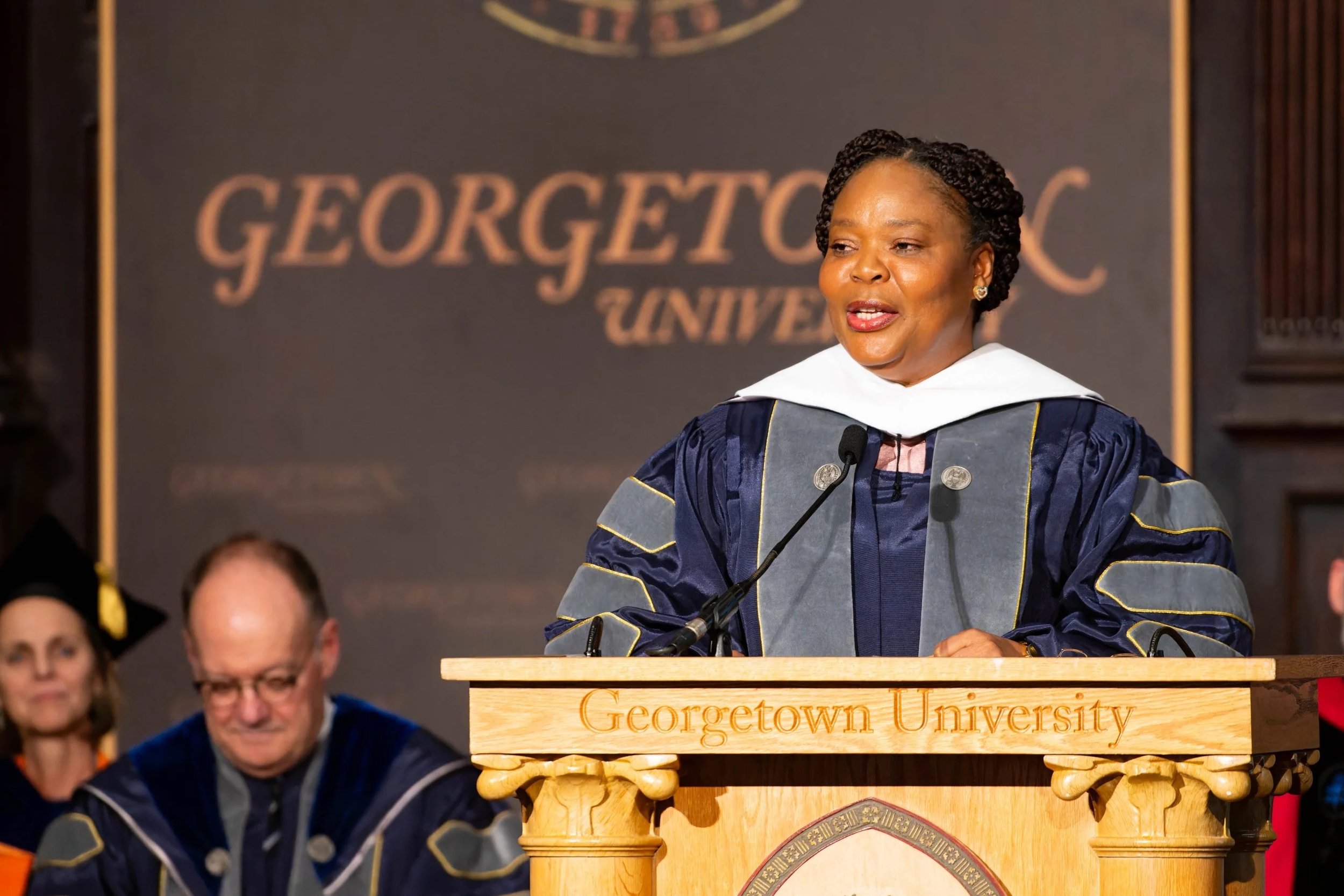On Peace and Restoring Broken Communities: Nobel Peace Laureate Leymah Gbowee Presents Oliver Tambo Lecture at Georgetown University
Leymah Gbowee delivers the Oliver Tambo Lecture in Gaston Hall on February 13, 2024 (Georgetown University)
After receiving an Honorary Doctorate of Humane Letters from Georgetown University President John DeGioia, Nobel Peace Prize Laureate and now-Dr. Leymah Gbowee delivered the Oliver Tambo Lecture in Gaston Hall on February 13, 2024. In the lecture, titled “Peace Is…,” Dr. Gbowee shared her definition of peace and how her personal story and upbringing in Liberia in a Lutheran church inspired her commitment to peacebuilding in conflict-ridden areas.
The annual Oliver Tambo Lecture series, which seeks to explore current African issues, was instituted in 1987 in honor of the late Oliver Tambo, anti-apartheid activist and former African National Congress President. Past speakers include Archbishop Desmond Tutu and former UN Secretary-General Kofi Annan.
In 2011, Leymah Gbowee and Liberia’s first female president Ellen Johnson Sirleaf were awarded the Nobel Peace Prize for their work in peaceful, nonviolent conflict resolution. The honorary degree recognizes Gbowee’s pivotal role in ending Liberia’s second civil war and establishing the Women in Peacebuilding Network (WIPNET). She later founded Women of Liberia Mass Action for Peace, an interfaith Muslim-Christian coalition of female peace advocates, and the Gbowee Peace Foundation Africa, a nonprofit dedicated to empowering women across West Africa.
Gbowee’s accomplishments symbolize the possibilities of interreligious dialogue as well as the power of a common goal to unite different faiths via shared values that transcend religious boundaries. Together, Gbowee and Sirleaf tirelessly engaged in nonviolent peace negotiations, culminating in the 2003 peace talks, which ended the fourteen-year-long war.
In her speech, Gbowee discussed the challenges facing the global community today, suggesting that despite technological advancements and rapid modernization, amidst wars and ever-increasing polarization, “individualism is slowing down our reality as our communities shrink and conversations about our collective humanity fade under the din of political rhetoric.”
“Individualism is slowing down our reality as our communities shrink and conversations about our collective humanity fade under the din of political rhetoric.”
Gbowee continued by describing the dominant cultural narrative surrounding peace, pointing out that despite its emphasis in everyday conversations: “The more we try, the harder it seems to run from our grasp. Peace has become a mist. With all of our intellectualism, we seem to have also distorted and lost the definition of peace.” Peace should not be an ideological aspiration that exists only in theory and in the ivory towers of academia, but rather a hands-on application of peace in action, on the ground.
“With all of our intellectualism, we seem to have also distorted and lost the definition of peace.”
So, according to Dr. Leymah Gbowee, what is peace?
First and foremost, “Peace is centering people, and their needs, in all policies and strategies.” “Name people,” she demands. “Do not substitute them for stats and numbers.”
In her words, “peace is not just the absence of war, but the presence of conditions that give dignity to all.”
While describing her work healing war-torn, broken child soldiers, working with single mothers, and engaging violence-ridden communities from Chicago to Liberia, she emphasized the need for human compassion that does not reduce people to mere numbers. “By talking of numbers and stats, you’re talking about dead children, mothers in pain, siblings torn apart.”
But how do we prevent the all-too-frequent dehumanization of people? What does people-centered peace look like? Gbowee says one way “is having compassionate dialogue with the other, and rehumanizing our perceived enemies.”
In Gbowee’s words, true peace manifests itself through “The provision of our basic human security needs… equality, access to education… sacrifices, so everyone, irrespective of their perceived value, has the chance to be the best that they can be.”
Leymah Gbowee’s words are a powerful reminder of our moral obligation to recognize, honor, and meaningfully act upon fundamental principles of equality and the collective humanity of all.

